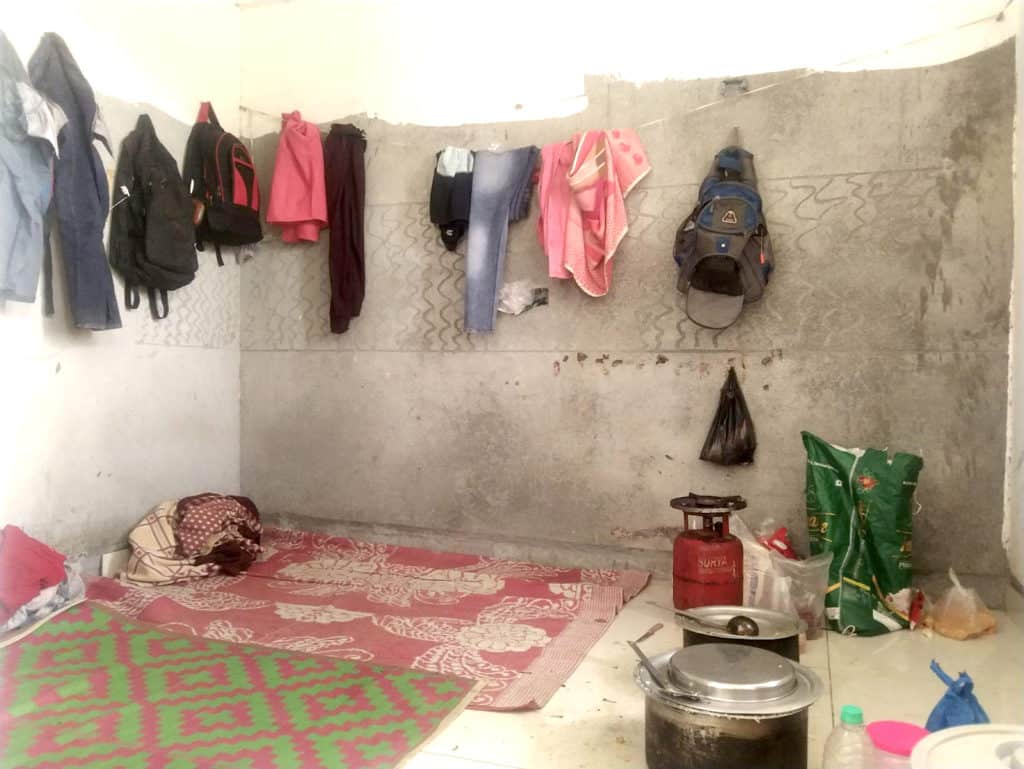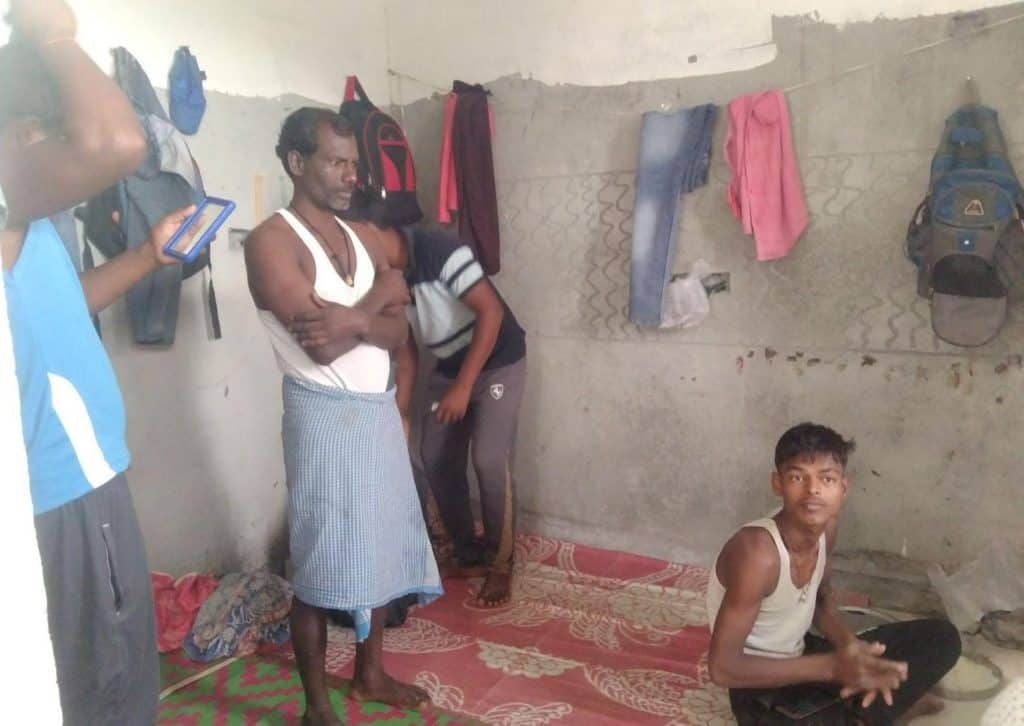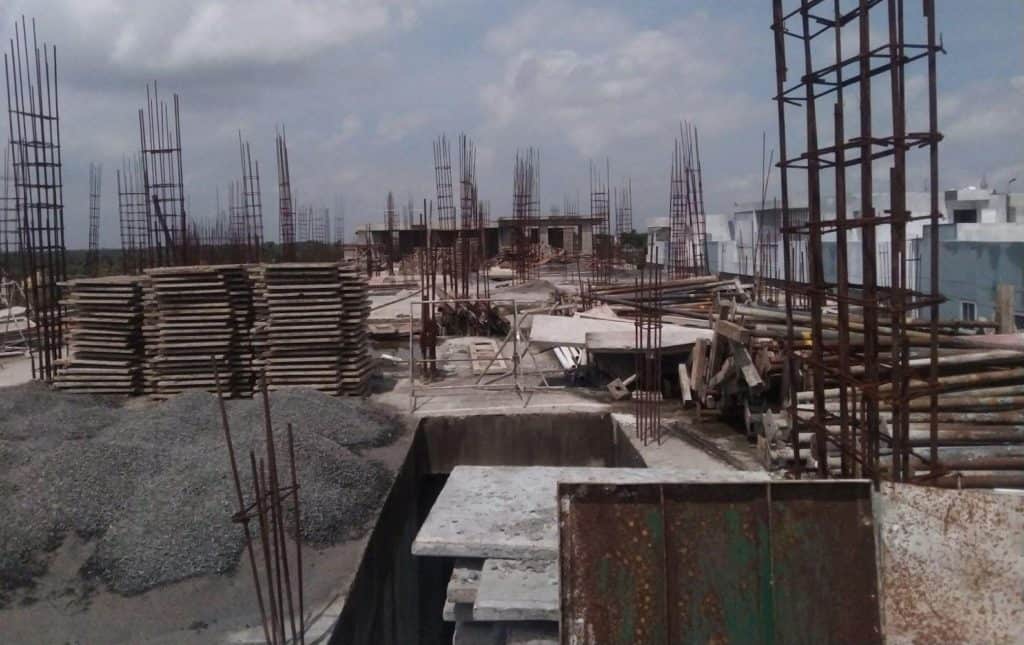Ratan Kumar, a migrant worker from Jamalpur in Bihar’s Khagaria district, lives in a small, dingy room along with five other workers, also from Bihar. The room, which is poorly ventilated and has no other amenities, is part of the construction site in the Sarjapur area where he works.
As buildings under construction do not have electricity, Ratan and his friends manage with candlelight at night and feel vulnerable to rodents and snakes, given all the debris and other waste lying all over the site.
“I cannot afford a rented room as I have to support a wife and four young children back home,” says Ratan, 26, who sends home Rs 5000 every month from his meagre salary of around Rs 9000. He puts in nine hours of work starting at 9 am till 5 pm, for 22 days a month on average. Not having a bank account, he has to send money through brokers, which costs additional broker fees.
Ratan had arrived in Bengaluru five years ago and found himself a job as a tile layer. But life has been tough for him and his fellow workers. His roommate, Bittu Kumar, 21, migrated from Khagaria around the same time. Though unmarried, he has to support his family of four siblings and elderly parents. Working as a tile layer and a mason, Bittu too says he cannot afford a rented room in Bengaluru.
Read more: Post-COVID working conditions could be more exploitative for informal workers
Mohit, 18, shares the same living space and has the same compulsions. But he has an additional problem. “I have a skin disease (that I got) from living on a construction site which means expenditure on doctors and medicines,” says Mohit.

Those working in Bengaluru longer, do better
At another construction site near Agara, Raja Ram, 55, from Bagha village, Betia, Bihar works on laying paving in the complex. But Raja has been in Bengaluru for the past 20 years and lives with his family of five members in a rented, pakka house with two bedrooms, one bathroom and a proper kitchen. Having lived and worked at different construction sites in the city, Raja Ram has been able to find jobs regularly and earns Rs 20,000-25,000 a month.
The difference between newcomers like Ratan Kumar and long-time residents like Raja Ram is that the latter has a local address proof and a state BPL ration card, which entitles him to subsidised gas, as well as water and electricity connections. He has a bank account and over the years has managed some savings.
So much so that his son Shivam Kumar is studying mechanical engineering at a government engineering college in Bangalore. Another son is doing his BA in Commerce and his daughter is preparing for the medical entrance exam.
But none of these construction workers have benefitted from any state government scheme for construction workers. And none are registered with the portal meant for construction workers which is necessary to apply for any benefits under government schemes.
“Yahan ke logon ko to mil nahi pata, mujhe kahan se milega kuch (People here don’t get any benefits, from where I will get anything),” was Raja Ram’s reply when asked. “Educating my children is my priority. That is why I am here so that the next generation will not have to work as labour”.
The Ministry of Labour and Employment’s eSHRAM portal is a national database of unorganised workers which includes migrant workers, gig and platform workers, construction workers etc. The workers registered under the portal are to be given accidental insurance cover of INR 2 Lakhs under Pradhan Mantri Suraksha Bima Yojana (PMSBY), all available social security benefits and assistance during disasters.
While the union government claims over 25 crore workers are registered (as of 30th January 2022), there is little information available on how many have actually got any benefits.
Karnataka has a separate scheme for construction workers alone. The welfare board to help construction workers is sitting on Rs 7000 crore without utilising it as per the CAG report.

Tin sheds and plastic sheets are the norm for migrant workers
Migrant workers, mostly semi-skilled labourers from the eastern states, come to Bengaluru looking for work opportunities that will pay them more than they can hope to earn back home. But few of them have a formal education; this enables contractors to exploit them in terms of wages and working conditions.
Most stay in groups of four to five in small tin sheds on the construction site or vacant areas nearby. Some set up plastic tents on the roadsides or under road bridges. A majority of them have no access to basic amenities like water, sanitation and basic hygiene. Living out in the open, they also face the possibility of theft or muggings.
Thanks to Swachh Bharat Abhiyan, local authorities have installed a few public toilets but they are insufficient to meet the need of migrant-dense clusters. Plus they are not conveniently located for the workers, whose work is often on the outskirts of the city.

Migrant workers unable to access ration cards
Workers like Ratan Kumar generally earn Rs 400-450 per day and a quarter of their monthly earnings, an average of Rs 2000, is spent on food. But they also have to spend on medicines as the unhygienic living conditions often lead to infections and other health issues. Ratan says the medicines cost him Rs 500-800 a month. He does not have access to a ration card here, as his family uses it in Bihar.
Other workers too, face the same challenge, as ration cards are needed by their families back home. Like Dilawar Hussain, 30, hailing from Murshidabad in West Bengal, “I buy from shops to cook food as the ration card is being used by my family back home,” says Hussain, who lives in a slum area, where most residents are immigrants from other states.
Read more: Heat, dust and other challenges facing construction workers in Mumbai
“Workers like me find housing in slums often plagued by sudden rent increases, where there are no other infrastructure and services”, says Dilawar.
Workers like Dilawar and Ratan are also at the mercy of the local agent who hires them and at times delays payment by a week or two, even a month. This makes life even more difficult for these workers, forcing them to borrow money to buy food and medicines.
A big chunk of workers’ incomes is sent to their families; much of whatever is left is spent on food, comprising mainly of rice, dal and potatoes, which is all they can afford. Non-vegetarian food is a luxury they can ill afford in an expensive city like Bengaluru.
Very informative